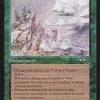Könnte sein, das ich demnächst Mal wieder einen Packen für dich zusammen habe ![]()
Bin gerade am Durchsortieren und da ist doch schon wieder Einiges, was nicht hierbleiben wird.
- Lotti hat sich bedankt
 Nicht angegeben
Nicht angegeben
 Geschrieben von » Arcanis «
am 23. Juli 2018 - 05:59
Geschrieben von » Arcanis «
am 23. Juli 2018 - 05:59
Habe den Facebook-Beitrag hier rein kopiert und etwas lesbarer editiert. So können auch Leute hinter einem restritiven Proxy mitlesen
Everything You Need to Know About the Reserved List, But Were Afraid to Ask
or
Why You Are Wrong About the Reserved List
13. JULI · ÖFFENTLICH
(to simplify sharing, here’s a link: https://tinyurl.com/TheReservedList)
I love talking about magic, and I love talking about the Reserved List, but I’m getting to the point where I haven’t seen a NEW intelligent argument in years. So it is my intent to put all my data here, then reference it whenever it gets brought up.
https://magic.wizard...licy-2010-03-10
So, without further ado:
Everything You Need to Know About the Reserved List, But Were Afraid to Ask
or
Why You Are Wrong About the Reserved List
This post is going to be long, and have a lot of things defined in it. But let’s start with The Reserved List itself. A long long time ago in MtG’s history, several things happened at around the same time.There is a minor clarification to make right from the start. The name “Reserved List” is used loosely, however it has two functions.
- The Company that made MtG reprinted a bunch of hard to find and valuable cards
- The Company that made MtG printed way too much product of the current sets
The list itself, the actual list, is a list of 572 cards. That is THE Reserved List.
The agreement not to reprint those cards is The Reserved List Promise.
Magic: the Gathering is a game. And a collectible. It is important to think about and realize how unique that intersection is. Comics are awesome. Baseball cards are neat. Beanie Babies and pogs are, well, whatever the hell they are. But for each of those four collectible items, it is important that people RARELY DO anything with them. At least not to the extent that Magic players use their cards. This is a collectible, where the enjoyment of the thing demands the use and consumption of the thing.
Because of that, if you get into Magic, spend $2000 on singles, play for a few years, and then sell out, you’re probably going to be able to sell your cards for $1200 to $3000. You’re a magic player, so that previous sentence didn’t phase you, but if you’re any other kind of hobbyist, that last sentence should strike you as pretty singular. If you buy $2000 in fishing equipment, use it for 3 years, then try to sell it, you’re not going to get $1200, and certainly not $3000. If you spend $2000 on rock climbing equipment, or aquarium supplies, or computer parts, or I don’t know what people do, Jet Skis let’s say, none of that is worth 60% after being used for 3 years, and certainly none of it is worth 150%. Magic Players, you have it good! Magic: the Gathering itself is awesome!
So why are Magic cards worth something? Because there’s demand for them, and there’s supply for them, and the supply is made by exactly ONE company, which means they can dictate how many of each card are out in the wild. If you don’t like the price of Chandra, Torch of Defiance made by Wizards of the Coast, you can’t go over to Fleer’s website and see if they’re having a sale. If you don’t like the Marvel price, you can’t see if there’s a DC version of it.
(Yes, I know you can’t just go see if DC has a “Wolverine”. However, because there are competitors, because you have a choice of Marvel and DC and Image (are they still around? It has been a while since I bought a comic book, sorry) if one company begins to lose sales, they can either change or shrink or die. The company that makes Magic cards doesn’t have that fear. You can try playing Vampire the Eternal Struggle, or Netrunner, or Force of Will, or Star Wars Destiny, but eventually that game will die, and you’ll be back for more MtG.)
Back in the day (1993-1995) they realized there was a supply problem, and printed Chronicles to give newer players access to cards that were previously quite expensvie. And they printed the hell (for the time) out of Chronicles. As a result of this, the old version prices crashed, many players were turned off by this, and collectors especially were very upset. In these ancient times, collectors made up a much larger percentage of the MtG buying population than they do now. There were also a lot more player-collectors by percentage. Because of this mistake, Wizards of the Coast made a promise. They made a list, they checked it twice, and they promised to NEVER print cards that were on that list. That promise is known as the Reserved List Promise.
You might not believe this, but that promise SAVED the game. If you were not playing then, you might not understand, however, if you were not playing then, you would NOT be playing now if WotC had not made that promise. This is partly because a critical mass of people would have tried to sell out, and the game would have died. Knowing that they would not make the Chronicles mistake again made magic stronger. It made it so that When you bought a deck worth $100, there was a lesser chance that three or six months from now, that deck would be worth $10, because many of the cards would be reprinted.
This is a faith based economy. I heard that! That noise you just made. That sharp intake of breath, signifying disbelief. I. Heard. That. This is a faith based economy. Supply and Demand are still very important, however, both faith and perception play a huge role in the pricing for this game. This is not a bad thing. Would you like proof that this is faith and perception based? When they announce a new set, and two months before release they spoil a card in it that is a reprint of an expensive card, does that card’s value go down right then, or does it go down when the actual supply is increased? Magic Players are smart. They know that if Chandra, Torch of Defiance is announced to be in a PreConstructed deck, then the value of Chandra is going to go down, even if there is no increase in supply until a month or two or three from now. Remember this, because it will be important later.
So Wizards of the Coast made a list of cards they promised to NEVER EVER reprint, in order to instill (more) faith into the marketplace. They wanted people to believe that when they buy a card on that list, a month after the purchase, there won’t suddenly be 100 times as many copies available to everyone else. They wanted us to believe that the supply was fixed. That’s what the Reserved List is.
------------------------------------------------------------------------
Look. This article is quite long. And I’m sorry about that. So let’s take a brief intermission. Umezawa’s Jitte is a ridiculously powerful card. But Tetsuo Umezawa himself is not amazing. He’s a 3 casting cost 3/3 who taps to destroy a tapped creature or a blocking creature. He doesn’t even tap for free like Royal Assassin. You have to spend 4 mana to do so. That means if you equip Tetsuo with his own Jitte, you can’t even really use his ability and also attack with him. How does that make any sense? You’re better off having Tetsuo hang back, and letting your Watchwolf swing while carrying the Jitte. Is that what he intended? Did he merely want to be the creator and outfitter of great weaponry rather than the user? I don’t know either.
------------------------------------------------------------------------
I know this is pretty exciting, but it is time to take a turn and talk about some legal stuff. For no particular reason, let’s talk about Promissory Estoppel. As a Shahrazad to that, let’s talk about Contract Law. I’m not a pilot, so if you’re ever on an airplane, and the pilots die, and you need someone to walk you through landing a plane, don’t call me, call Air Traffic Control. Similarly, I’m not a lawyer, and none of this article is legal advice. A contract is when someone agrees to do or sell something in exchange for something. If you pay in advance for that thing, and then that thing isn’t delivered, or the service isn’t rendered, you may be entitled to damages, because it was a breach of contract.
So what the hell is promissory estoppel? In the course of business, companies frequently find themselves having to make statements. They need to communicate to their shareholders, to their employees, and to their customers about what is going on, and why they are doing things. To oversimplify, Promissory Estoppel is like a contract, with no consideration given. If you agree to mow my lawn for $50, and then don’t, you owe me that $50 if I paid it to you already. That $50 is called the “consideration”, essentially the benefit to the party performing its side of the contract. When someone makes a promise without consideration, they are saying “I’ll mow your lawn” but without you paying them $50 in advance or ever. So what happens if they don’t mow your lawn? Well, in most cases, if you didn’t pay them anything, there’s not much that can be done. But let’s say you’re talking to someone, and you say “I’m selling my house, and I need my lawn mowed. If it doesn’t look nice, it won’t sell.” If your friend says “I promise to mow your lawn” now something else is happening. You are relying on his promise, and building upon it. Instead of hiring a lawn service, or paying the neighbor’s kid to mow your lawn, you are relying on this specific friend to mow your lawn, because you are showing the house to sell it, and want it to look nice. If he does not mow the lawn, and if the showing happens and does not go well because the yard looks terrible, you CAN sue him for damages under promissory estoppel. Especially because he knew about the showing, and knew that the showing going well relied upon the lawn being mowed.
Let’s consider another promissory estoppel case. There are three plots of land, all in a row, lot A, B and C, owned by Alex, Becca, and Carlos respectively. All three of them bought the land at the same time, and are friends. While hanging out they discuss what they’re going to do with their land. Alex and Carlos are considering constructing apartment buildings. Becca isn’t really into business but loves the outdoors, and loves when other people enjoy the outdoors, and decides to build a park there. Becca tells Alex and Carlos, “I promise this land will always be free use. I will build swing sets, sandboxes, and a soccer field, and anyone can use it at any time.” Becca does so, and Alex and Carlos build nice apartment buildings on either side. Because of their park views, Alex and Carlos’s aparments do quite well. Because Becca said she’d make a park, Alex and Carlos developed their land, knowing that their apartment buildings would benefit from having a park there. Note that even if Alex and Carlos bought their land for $1000 each, if they’ve developed it into apartments, and spent capital improving it, that property is now worth well more than that $1000. They didn’t even need to buy it from Becca. If Becca decides to build her own apartment building, or if Becca passes away, or sells the land, and the new owner decides to build an apartment building, Alex and Carlos will suffer a loss as a result of it. Alex and Carlos RELIED on Becca’s promise to develop their land. Even if the land cost them $1000 each. If it is now worth $300,000, and Becca builds a building between them, and it devalues their investment to $100,000, even though at the time of the promise they spent $1000, because they relied upon Becca’s promise, and because she broke that promise, they are entitled to damages from Promissory Estoppel. Note that when you’re buying or selling something, you need to point out all of the potential flaws to the prospective buyers. If Becca ever tries to sell her land, disclosing that there is a Promise in affect is certainly material to the sale.
https://www.investop...ry_estoppel.asp
The doctrine of promissory estoppel states that an injured party can recover damages if those damages were the result of a promise made by a promisor and the promise was significant enough to move the promisee to act on it.So what does Promissory Estoppel have to do with the Reserved List? If Wizards reprints cards from the Reserved List, or even removes the Reserved List, they WILL be sued by people who own Reserved List cards, and the basis of that suit will be Promissory Estoppel.
- A Promise must have been made.
- Someone must have relied on that promise (detrimental reliance)
- If that promise is broken, those relying on it will suffer significant damages.
Wizards of the Coast made a promise. “We will not reprint these cards.” They have doubled and tripled down on this promise, and reiterated it. Even after the company that made the promise transferred in ownership, the new owners, Hasbro, have reaffirmed the promise.
The magic community relied on that promise. We as a community said “This game was going to die, but instead of putting money into comics or pogs or this other tcg based on an electric yellow mouse, I’m going to continue playing this game, and buying cards, because I believe that these cards that I buy will be worth money in the future.”
If WotC reprints cards from the Reserved List, the cards on the Reserved List will fall in value. If WotC announces it intends to reprint them, the values will decrease. If WotC says they’re going to reprint 10 and ONLY 10 Black Lotuses, as a promotion, the value of ALL Lotuses will go down significantly.
Why?
This is faith based, (remember?) and adjustments happen on announcement, not on release. Even if WotC says they’ll only print 10, they will be BREAKING their promise, and breaking faith, and people will be thinking “Well, they said they’d NEVER reprint them, and now they’re saying they’ll print 10. But maybe they’ll print more in the future. Instead of buying now, I’ll wait, and buy some of the new ones, whenever they come out.” So anyone who is considering buying a Reserved List card now has incentive to wait with the epxectation that prices will sink in the future. Their action contributes directly to the cards decreasing in value. This faith based economy is absolutely effected by not just supply and demand, but the perception of the future. By the perception of future supply and future demand.
------------------------------------------------------------------------
Can we talk about Royal Assassin for a minute here? On the face of it, the card’s name seems pretty simple. But if you really start to think about it, there are a lot of possibilities. A Royal Assassin could be:
-a killer employed by royalty
-an assassin who specializes in killing royalty
-royal could be a title, within an assassin’s guild
-a member of royalty who is actually an assassin
-a name given sarcastically to a particularly bad assassin
------------------------------------------------------------------------
Ok, its number time. Because numbers really really matter.
Here’s how many of each rare from each set were printed:Let’s talk about the value of the Reserved List. Usually when arguing with people, I merely talk about one card, Underground Sea. It is a card most people have seen, it is a card most people understand the usefulness of and the value of, and it is just one card. Underground Sea has been in basically 4 sets, Alpha, Beta, Unlimited and Revised. There are also non-english printings of it. And when talking about it, I usually talk about Revised Underground Seas. There are about 300,000 of them out there, and the “med price” as of this writing is $576.21 each, whereas the cheapest LP version is $505 on tcgplayer. Let’s say the average price is $550 (which is quite low). That’s $158,950,000 in Underground Seas. If you’re from Scottland, and would prefer to value them at about $350, then we’re still talking about $105,000,000. Say it outloud. Right now. All the REVISED Underground Seas together are worth about 105 MILLION dollars. That is usually the arguing point I bring up to people, however, because I intended to go into a bit more depth, and because I have nothing but time on my hands (sigh,) today you’re going to get a better picture of what the Reserved List is worth.
- Alpha 1100
- Beta 3200
- Unlimited 18500
- Revised 289000
- Legends 19500
- Arabian Nights 20500
- Antiquities 31000
- The Dark 128000
- Fallen Empires 744000
- Ice Age 202000
- Homelands 413000
- Alliances 326086
- Mirage 242424
- Visions 240000
- Weatherlight 240000
- Tempest 242424
- Stronghold 272727
- Exodus 272727
- Urza's Saga 363636
- Urza's Legacy 303030
- Urza's Destiny 303030
There are 572 unique cards on the Reserved List. Ignoring non-English printings (revised, and The Dark forward,) there are 692 editioned cards on the list. While Reserved List cards can’t be reprinted now, there are of course 4 versions of Underground Sea, 4 versions of Tundra, 3 versions of Mox Jet, 3 versions of Volcanic Island, and so on.
Of those 692 cards, 289 of them are worth more than $20. If you take those 289 cards, multiplying each medium value by the quantity of them out there, they total $3,536,621,684.73, that’s $3.5 BILLION dollars. Hasbro, who now owns Wizards of the Coast, is worth about $5 Billion dollars, and makes about $550 million, or $0.55 Billion dollars a year. (https://en.wikipedia.org/wiki/Hasbro)
Why does what the Reserved List cards are worth matter?
If we assume Wizards of the Coast will start reprinting cards from the Reserved List, the value of those cards would go down. A Revised Underground Sea is worth $450. If WotC announced they were printing “Reserved List Masters” and that Underground Sea was in it, Underground Sea would drop in value. How much would it drop by? I don’t know. Probably most of its value. Even if it were a limited product like From the Vault, even breaking the promise a little would SHATTER the faith in the market that the Reserve List promise creates. How much they print doesn’t matter as much as the fact that they ARE printing more. If Underground Sea drops from $450 to $100, that is a loss of about $100,000,000. If the whole Reserved List follows suit, it would be a loss of about $3 BILLION. All we’ve looked at are the most expensive cards from the Reserved List, and there’s a reasonable argument that if reprinted the most expensive cards wouldn’t lose as much value. And that is certainly partially true. If you sort the list by price, the highest priced cards are all Alpha cards, then Beta, then Unlimited cards. However on a percentage basis, there’s not that much value there because Alpha, Beta and Unlimited were not as heavily printed as later sets. So let’s IGNORE A/B/U entirely. That removes 139 cards from the list. The remaining 150 cards still make up about $2.5 BILLION in value. The top of this list is held by cards like The Tabernacle at Pendrell Vale, Bazaar of Baghdad, Library of Alexandria, Mishra's Workshop, Juzam Djinn, Moat, The Abyss, Candelabra of Tawnos, Chains of Mephistopheles, and the Revised Dual Lands.
If WotC Reprinted items from the Reserved List they WILL be sued. Not maybe. Not possibly. Not “highly unlikely”. But an absolute certainty. That suit may or may not be successful, but it would absolutely happen. So if you’re WotC, or more importantly, if you’re a lawyer of Hasbro, how do you begin to think about this problem? Well, let’s say you’re an optimist. Let’s say you think this lawsuit only has a 10% chance of being successful. If the total damages are $2,500,000,000 and have a 10% chance of happening, then this lawsuit will cost you $250,000,000. That’s 250 Million Dollars. That is a third of what your company makes in year.
The real number one reason why they will never reprint cards is that they fear a suit. Not a successful suit, not a hypothetical suit, but because the POTENTIAL for damages is so high, even a low probability of success leads to a catastrophic outcome.
But let’s keep going. While I appreciate that you’ve kept up with me through this ridiculously long article, I sense that you are still not convinced. The rest of this will be a more Socratic look at the situation.
1) Dan. If they print more Black Lotuses, then more people can play Vintage, and the value of Black Lotuses will go up!!! Thus, you can’t sue.
No. If they break the list in even a little bit, faith will be shattered, and prices will tank. Because if they break it a little bit, even with a promise to never break it after that, this faith based economy will crash. More people will play vintage, that I would agree with. However, how large would that gain be? 5%? 10%? If values tank by 80%, you need a 400% increase in vintage players for demand to balance out supply to stabilize prices.
2) Dan. Why don’t they just print Snow-Covered Dual Lands, and Snow-Covered Lotuses, or Legendary Dual Lands?
In the Reserved List definitions, they have specifically said they will not do this thing. Functional reprints, the same card with a different name, or a card that is better or slightly worse are all forbidden by the promise. Printing Snow-Covered Duals would be a breach of the promise, and would crash prices.
3) Dan. Why doesn’t Hasbro create a shell company, sell MtG to that, and then….
When you buy a company, you buy its assets and its liabilities. Imagine you made a company called ABC Corp. ABC corp then gets a loan for $100,000. ABC goes to the bank, and takes that money out in the form of 1000 $100 bills. Imagine you make a company called XYZ Corp. XYZ then buys ABC. They look around and say, “Geez, we’ve got these $100 bills just sitting around, let’s sell them online for $90”, so they do so, and they sell. Like, real quick. XYZ just made a cool $90,000. But they don’t get to say to the bank, “Hey, sorry bout that $100,000, yo, that was ABC corp, we’re XYZ corp. Totally different.”
It is the same with the Reserved List promise. That is a thing that the company carries with it, If you sell WotC, or buy WotC, you’re transacting the Reserved List with it. If you don’t, all sorts of crazy ABC/XYZ things can happen. I promise you, you don’t want to live in that world.
Similarly if you try to “licence” the ability to print the cards to another company, either you or the other company or both would be sued. If you’re a printing company, and WotC came to you and said “hey, print these cards because we don’t want to be sued”, you’re not going to print them, because you also don’t want to be sued.
Finally, if it were that simple, they’ve had 15+ years to do it, and they haven’t.
Even more finally, if such corporate shell games were even possible, it would make it so that the Reserved List and other contractual obligations by corporations would be meaningless to begin with.
4) Dan. If they reprint the Reserved List cards, they’ll make so much they can cover the lawsuit.
No. No revenue from any set has ever been $1 billion. No set has ever made even 1% of that. It is not even close.
5) Announce reprints, but say they won’t come for another 5 years.
The market would crash on announcement, and never recover. There is a good chance the company would not exist in 5 years to do the reprint.
6) Spend a whole bunch of money, fix Magic Online, increase the total number of MtG players from 10m to 60m, use the money from that to pay off any hypothetical losses from the Reserved List
This honestly would have worked in 2005 and maybe as late as 2009. At this point, their malfeasance with Magic Online and the skyrocketing prices of Reserved List cards have made it so the first no longer offsets the the second.
7) Have WotC go on the market and buy up all the Reserved List cards
Even if WotC began doing this, after buying merely 1% of any card, that card’s value would double, and become that much harder for them to get. This solution has the literal opposite effect as intended. Right now there are 78 Revised Underground Seas on tcgplayer. SEVENTY EIGHT. There are 300,000 out there. There’s another 70 on ebay. If you bought all 148 of those, it would cost you $120,000, and you would have bought 0.04% of all of them out there. You can’t event dent this market without significantly affecting the market.
8) Reprint the Reserve List, but in a From the Vault, so it is limited
Again, any reprint, even in a limited form, would signify a break in the promise, and has or implies infinite potential for reprint in the future. This would not work.
9) Do the hidden treasures thing like they did in Zendikar.
When they did this, they bought them on the secondary market, they didn’t print more. By removing them from the secondary market, they increased the price, this amount would have an equal upward effect as the downward effect of giving them away “for free” as hidden treasures.
10) Magic players aren’t REALLY going to sue if they reprint. That’s dumb.
I’m telling you this because I’m pretty deep in the community. There are collectors with collections that would boggle your mind. So much so that paying a lawyer for 10 hours of work is nothing. To the point where paying a lawyer to write up a statement in anticipation of WotC breaking the promise costs far less than the monthly payment on an insurance policy for the collection itself. If WotC breaks its promise, the lawsuits will come within 24 hours. And that will quickly turn into a class action suit. People who haven’t touched their cards in years, and have forgotten about them completely will be coming out of the woodwork to join the class.
11) If they reprinted Reserved List cards, people would only be able to sue for the value the cards were at when the Reserved List promise was made. For example, Underground Sea was worth $10 back then, not $550.
No, that’s not how Promissory Estoppel works. You rely on the promise and make decisions. The value is never set in stone or in time. And certainly not set at the time of the promise. At the time of the promise, the value is almost always neglible. It is acting upon the promise that creates value. Promissory Estoppel is forward looking.
12) Most/Many Black Lotuses and other cards have been destroyed over the years.
Sigh. Once a week we get “black lotus guy” in the store. “Oh man!” he says, “Magic is still around? When I was younger I had 4 of each Alpha and Beta and Unlimted, including Lotuses and Moxes and power. But I went to college and my mom threw it away.” No. No you didn’t. No, no she didn’t. I would be shocked if more than 1% of any card from any printing has been destroyed.
13) Why don’t they just stop supporting the old formats? Then prices of the Reserved List and other cards will drop, and then they can reprint them and then pay off the lawsuit.
There are two problems with this. The first is that WotC is already nearly at zero support for the old formats. Their popularity has been hurt, but no matter what, they are not going away. The second problem is that no matter how much the cards drop in value, the payoff is still quite astronomical. If you somehow halve the value of Reserved List cards by doing something like this, you’re still looking at nearly a two billion dollar lawsuit.
14) Old formats don’t make WotC any money, because old formats don’t sell packs.
This is a complicated side argument which is false. First let’s look at “The only way WotC makes money is by selling packs.” This is untrue. They also run MODO, and run events there. The packs they sell they sell to WPN stores and others do make up a large portion of their sales. WPN stores, and players bringing their friends to WPN stores is one of the most intense ways they acquire new players, new customers. However, part of the way many WPN stores stay in business is through the selling of singles. If you kill all formats aside from Standard and Draft, very quickly many WPN stores would go out of business because of the loss of singles sales. This would also be catastrophic for Wizards, as all of a sudden, many of the people who formally bought packs from WPN stores would no longer have anywhere to go to buy their packs. Of course they can buy them online, but they’ll buy less, and they’ll buy less on impulse, and they’ll have one less very important place to play. Older formats do not sell AS MANY packs as new formats, however they are still important to the overall health of the game. When MtG has been at its best, all formats were supported and doing well.
15) There was no contract. They didn’t sit down with a player’s union and agree to anything
Promissory Estoppel is for the exact situation where there ISN’T a contract.
16) Just make Collectors’ Edition and International Edition legal.
This is a pretty neutral thing. It would not cause a lawsuit, however it wouldn’t help demand at all. There’s about 15,000 of every ABU card. Adding that few to the pool does not affect the market.
100) Dan. You are OBVIOUSLY biased. Of course you don’t WANT them to reprint Reserved List cards. You have thousands of PowerNine cards, and a reprint would only hurt jerks like you. Why should we believe anything you say?
I love this question, and its less polite varients. I love this game. I can’t state that enough. While I do believe the Reserved List saved the game, I also believe it is holding the game back. They SHOULD reprint the Reserved List. They merely lack the tools to do so. Magic is at its best when it has a variety of different formats, with different barriers of entry, all doing well. Magic is an ecosystem. While it is obvious the way Standard and Draft formats “sell packs”, all formats contribute to the overall environment to create an economy where WotC can do well. I honestly believe that in addition to not fixing MODO, one of the largest mistakes WotC has ever made is not supporting older formats, even though on the lowest level they don’t “move product”.
I WANT them to reprint Reserved List. I want them to support the old formats. I also don’t want them to kill the game or their company. In general, those things are at odds with each other.
 Geschrieben von Choke
am 23. Mai 2018 - 20:46
Geschrieben von Choke
am 23. Mai 2018 - 20:46
 E3C0EF3C-336D-46B2-B934-2F69CE8B2E1E.jpeg 178,09K
1 Mal heruntergeladen
E3C0EF3C-336D-46B2-B934-2F69CE8B2E1E.jpeg 178,09K
1 Mal heruntergeladen
 Geschrieben von Assimett
am 09. Mai 2018 - 15:33
Geschrieben von Assimett
am 09. Mai 2018 - 15:33
 Geschrieben von timeless
am 07. Mai 2018 - 11:15
Geschrieben von timeless
am 07. Mai 2018 - 11:15
 Geschrieben von Nekrataal der 2.
am 30. November 2016 - 19:04
Geschrieben von Nekrataal der 2.
am 30. November 2016 - 19:04
Jeder Laden, der nichts bietet außer dem Kauf von Produkten kann sich auf dauer nicht halten, egal in welcher Branche.
 Geschrieben von Lim_Dul
am 30. November 2016 - 16:19
Geschrieben von Lim_Dul
am 30. November 2016 - 16:19
Startgelder sind nur dann von der Mehrwertsteuer befreit, wenn die Veranstaltung von einem gemeinnützigen Verein veranstaltet wird:
andere kulturelle und sportliche Veranstaltungen, die von gemeinnützigen Vereinen durchgeführt werden, soweit das Entgelt in Teilnehmergebühren (z.B. Startgeld) besteht. Darunter fallen z.B.
* Musikwettbewerbe,
* Sportwettkämpfe
* Trimmveranstaltungen
* Volkswanderungen
* Marathonläufe
Umsatzsteuerfrei sind die von den aktiven Teilnehmern erhobenen Teilnehmergebühren. Für die Eintrittsgelder der Zuschauer kommt dagegen die Steuerbefreiung nicht in Betracht.
Was hier schon häufiger angesprochen wurde. Viele Läden (und damit auch Turniere) werden von Enthusiasten betrieben. Das sind Leute, die das aus Spaß an der Freude machen und dafür bereit sind auch mal bei der Kalkulation schön zu rechnen "Hauptsache keine Miese". Davon kann man aber nicht auf Dauer leben. Das heißt entweder haben die andere Einahmequellen oder sind irgendwann weg vom Fenster.
Es gibt sehr wenig Veranstalter die es wagen, mal was größeres auf die Beine zu stellen. Das liegt zum großen Teil auch daran, dass man da dann wirklich wirtschaftlich kalkulieren muss und auf einmal viel Arbeitszeit wirklich bezahlen muss und nicht mehr sich schönrechnen kann.
Lösen kann man das Problem nur auf zwei Arten:
* Spieler akzeptieren, das ein spürbarer Teil der Teilnahmegebühr für die Kostendeckung verwendet wird und nicht als Preisgeld ausgeschüttet wird.
* Wizards unterstützt die Läden/Organisatoren darin, dass sie attraktive Preise rausgeben können, die der Laden nicht zu 100% aus dem Startgeld finanzieren muss.
 Geschrieben von BTTony
am 30. November 2016 - 09:20
Geschrieben von BTTony
am 30. November 2016 - 09:20
Die Quintessenz ist einfach die, dass die Leute uns Shopownern einfach gönnen müssen, dass wir Geld verdienen.
Vollkommen richtig.
Als Neueinsteiger lese ich bisher ja nur mit, weil ich zu den Abläufen nichts sagen kann.
Was mir aber auffällt, ist das immer nur geschaut wird, wie rechtfertigt sich der Preis aus Kostensicht. Ich habe in diversen Freizeittätigkeiten schon Turniere oder Events besucht und die Kostenstruktur habe ich selten hinterfragt. Als Teilnehmer muss ich doch überlegen, ob ich genug geboten bekomme. Auf Streetballturniere bin ich doch nicht gefahren, weil ich für 12 EUR einen Apfel, ein Getränk und ein Shirt bekommen habe, sondern weil jemand die Plattform geboten hat, mir einen Tag Wettkampf zu bieten. Da hätte der Veranstalter an meinen 12 EUR auch gerne 15 EUR verdienen können.
Wenn in einer Kneipe ein Live Konzert ist, trinke ich doch dabei auch was und halte mich nicht an einem Bier fest. Und wenn jemand einen Freitag Abend in seiner Örtlichkeit Magic Spielen ermöglicht, kann es nicht anders sein, als dass ich 10-20 EUR in irgendeiner Form da lasse. Zumindest von jedem der volljährig ist, muss man doch so eine Wertschätzung erwarten dürfen. Oder ich gehe eben nicht hin.
 Geschrieben von Wrathberry
am 30. November 2016 - 08:24
Geschrieben von Wrathberry
am 30. November 2016 - 08:24
und genau weil Spieler sowas wie 90% Payout erwarten, gehen Läden pleite. Sad Story....
 Geschrieben von JensK
am 24. November 2016 - 03:18
Geschrieben von JensK
am 24. November 2016 - 03:18
Ok dann schreibe ich mal die Ladenkosten nieder
Frankfurt München Köln
Da muss man 6 Tage die Woche aufmachen ca 65 Stunden Offen kommen wir auf ca 80 Arbeitsstunden mit den Schichten die man doubeln muss weil es einfach voll ist mit 2 Vollzeitkräfte
Wir brauchen 70 qm für ein Trading Card only Konzept wie in Frankfurt
Miete ca 2500 Euro Warm
Versicherung ca 250 (Inhalt Haftpflicht usw)
Gehälter 5000
Abschreibung der Austattung und Modernisierungen 500 Euro
Knapp 8000 Euro kosten
und ein Laden ist nicht alle Tage voll
Ein Laden in einer 100.000 Einwohner Stadt
da würde ich 4 Tage aufmachen im schnitt 10 Stunden das schafft der Inhaber mit einer Aushilfe.
2500 Für den Inhaber
550 die Aushilfe
1000 Euro Miete
Verischerung 250
4300 Euro kosten
Und da fehlen noch Sachen wie wo kommt das Kapital her. Die 100.000 Euro Ware kann man auch in eine Wohnung investieren und Miete bekommen. Oder Aktien kaufen ![]()
Für Werbung habe ich jetzt auch noch keinen Cent ausgegeben, reich wird man mit einem Ladengeschäft nicht auch nicht in den Grosstädten.
Ciao Jens
Genau mit dieser blauäugigen Einstellung eröffnen jedes Jahr sehr viele Magic-Onlinehändler und schließen dann nach kurzer Zeit wenn das vorhandene Geld verbraucht bzw die Liquidität ausgereizt und keine weitere Expansion möglich ist wieder. Damit man als Onlinehändler den besten Einkaufspreis hat muss man viele Einkäufe per Vorkasse bezahlen. 100 Displays kaufen und mit einem kleinen Gewinn verkaufen kann in der Tat dank MKM jeder. Davon leben oder gar den Aufbau eines größeren Geschäfts finanzieren kann man aber nicht. Die nötige Expansion auf eine Größe bei der man als Onlinehändler profitabel arbeiten kann zu finanzieren, das ist die Krux, und an der scheitern nahezu alle neuen Onlinehändler.
Games Island aufzubauen war unglaublich kapitalintensiv, ohne unser bereits vorher vorhandenes großzügiges Eigenkapital wäre uns das nie möglich gewesen.Und auch ein kleiner oder mittelgroßer Onlinehändler der Geld verdienen will wird schnell mehr Kapital benötigen als jedes Ladengeschäft.
Im forum fehlt ein Unterschrifts Feld stimmt zu 100%
 Geschrieben von Games-Island
am 23. November 2016 - 20:55
Geschrieben von Games-Island
am 23. November 2016 - 20:55
Ich habe beim Onlinehandel nicht unbedingt von Magic gesprochen, ich kenne es zum Beispiel aus dem IT Bereich. Der Distributor stellt mir sogar den Shop (kostet glaube ich 99€/ Monat) zur Verfügung. Ich stelle meine Marge ein, entweder für jeden Artikel einzeln oder pauschal. Kunde bestellt, die Bestellung geht direkt an den Distri, der verschickt und ich zahle die Ware 14 Tage später per Rechnung. Was für einen Aufwand habe ich da noch?
Das soll kein Angriff auf Dich sein, bitte nimm es nicht persönlich, aber wer denkt, dass erfolgreicher Onlinehandel so funktioniert hat sich noch nicht tiefergehend damit beschäftigt. Das ist die Garantie um pleite zu gehen oder zumindest um 99€ / Monat + Arbeitszeit zu verschwenden.
 Geschrieben von Games-Island
am 23. November 2016 - 20:34
Geschrieben von Games-Island
am 23. November 2016 - 20:34
Ich rede von größeren Dingen, wo ich 10 - 15% fair finde.
Wenn nicht der Kunde daran Schuld ist, der die Entscheidung online zu kaufen da günstiger bewusst trifft wer dann?
Der lokale Händler, der eben Marge X benötigt, weil er anders als der Onliner Kosten zu tragen hat?
Wenn ich zwei vergleichbare Läden habe und einer fährt an die Wand, dann hat dieser falsch gerechnet, oder das Konzept war mies.
Aber Lokal mit Online zu vergleichen ist Äpfel und Birnen. Nen Onlinehandel kann jeder und seine Oma aufmachen, teilweise sogar mit Backlink auf den Distributor, so dass der Onliner nur noch die Marge einfährt und Versand und sämtliches Drumherum dem Distri überlässt. Für einen Laden benötige ich erstmal Kapital und muss jeden Monat die Fixkosten zahlen.
Genau mit dieser blauäugigen Einstellung eröffnen jedes Jahr sehr viele Magic-Onlinehändler und schließen dann nach kurzer Zeit wenn das vorhandene Geld verbraucht bzw die Liquidität ausgereizt und keine weitere Expansion möglich ist wieder. Damit man als Onlinehändler den besten Einkaufspreis hat muss man viele Einkäufe per Vorkasse bezahlen. 100 Displays kaufen und mit einem kleinen Gewinn verkaufen kann in der Tat dank MKM jeder. Davon leben oder gar den Aufbau eines größeren Geschäfts finanzieren kann man aber nicht. Die nötige Expansion auf eine Größe bei der man als Onlinehändler profitabel arbeiten kann zu finanzieren, das ist die Krux, und an der scheitern nahezu alle neuen Onlinehändler.
Games Island aufzubauen war unglaublich kapitalintensiv, ohne unser bereits vorher vorhandenes großzügiges Eigenkapital wäre uns das nie möglich gewesen.Und auch ein kleiner oder mittelgroßer Onlinehändler der Geld verdienen will wird schnell mehr Kapital benötigen als jedes Ladengeschäft.
 Geschrieben von Games-Island
am 23. November 2016 - 14:29
Geschrieben von Games-Island
am 23. November 2016 - 14:29
Danke an alle für das Mega-Feedback. Sogar der JensK liest ja hier mit habe ich gesehen :-) Klar verdient der Jens auch Geld, ich wollte nicht sagen dass niemand außer uns, MKM und Wizards Geld verdient. Aber ich würde schätzen dass die meisten Marktteilnehmer kein Geld machen und man sieht es ja auch daran, dass ganz viele schnell wieder aussteigen und sogar insolvent gehen.
Hier noch ein Denkanstoß: Vergleicht das mal mit McDonalds. Ob man das mag oder nicht ist ja jedem selbst überlassen. Aber habt ihr schon mal gehört, dass ein McDonalds zu machen musste, weil er sich nicht gelohnt hat? Die Filialen gehören den Geschäftsführern, nicht McDonalds selbst. Da wird solide geplant und der "Hersteller" achtet darauf, wen er als Partner annimmt und vor allem, dass sein Produkt dem Verkäufer an diesem Standort immer genug Geld bringen wird. Da gibt es sogar Vorschriften, dass die Inhaber ein relativ teures Auto (Elektroauto ist auch OK, wegen dem Image) fahren und sich sozial engagieren müssen. Das soll alles ausstrahlen: "Mach einen McDonalds auf, und Du wirst immer erfolgreich sein". Auch für die Kunden ist es beruhigend, wenn die Filialen offensichtlich keine Geldprobleme haben und Gammelfleisch o.Ä. verarbeiten müssen.
Ich bin der Meinung WotC müsste auch diesen Ansatz haben. Sie haben das Monopol auf ein geniales Produkt und sorgen aber nicht dafür, dass Ihre wichtigsten "Vertriebler" (die Läden) genug Geld verdienen, weil sie ein System geschaffen haben, das Online-Discounter wie uns und die ganzen Garagenhändler auf MKM bevorteilt. Jemand wie das FUNTainment in Nürnberg oder München, meines Wissens nach beides sehr große Turnierveranstalter, die dem Spiel seit über 15 Jahren Spieler zuführen, müssten meiner Meinung nach von Wizards mit Handkuss empfangen und mit Boni zugeschüttet werden. Ohne diese Leute wäre Magic in Deutschland viel schwächer als es eh schon im internationalen Vergleich ist.
Trotzdem sehe ich da keine Ferrarris vor der Tür, sondern der Nürnberger Laden ist jetzt sogar in eine Billiardhalle(?) umgezogen. Vergleicht das mal mit anderen Branchen. Magic macht allein in Deutschland zig Millionen Umsatz pro Jahr, und die TOP TOP Promoter/Veranstalter/Verkäufer müssen sich überlegen, wie sie Ihre Ladenmiete bezahlen. Da passt doch was nicht?! Und der einzige der das ändern kann ist der Hersteller. Klar könnten wir auch Games Island schließen und MKM kann die Seite offline nehmen, aber dann kommen die nächsten mit dem gleichen Konzept nach.
Kyoden meinte, dass man nicht dem Hersteller den schwarzen Peter zuschieben darf und sagen darf "ich kann nur Discount, weil ihr nichts anderes zulasst". Wir KÖNNEN bestimmt auch Ladengeschäfte eröffnen, aber am Ende des Tages möchte ich Geld verdienen und das Geschäft erweitern, für meinen persönlichen Vorteil (wie jeder Unternehmer), aber auch um langfristig Arbeitsplätze zu schaffen und zu erhalten (wir haben einige Angestellte), Steuern zu zahlen und soziale Verantwortung zu übernehmen. Nach einer Analyse der Marktsituation sind wir zu dem Schluss gekommen, dass ein Online-Discount-Konzept das sinnvollste ist, wenn man im Bereich Magic eine große Firma aufbauen möchte. Wären die Rahmenbedingungen anders, dann gäbe es jetzt vielleicht schon 10 Games Island Filialen.
 Geschrieben von methadron
am 23. November 2016 - 14:22
Geschrieben von methadron
am 23. November 2016 - 14:22
 Geschrieben von
Gast
am 23. November 2016 - 10:51
Geschrieben von
Gast
am 23. November 2016 - 10:51
Schlag mal vor, wie ein Laden sich nur durch Spielen finanzieren soll? Würde bestimmt massig Leute interessieren^^ Am besten einfach die Ladenmiete und alle laufende Kosten auf die Spieler umlegen?



 Inhalte finden
Inhalte finden